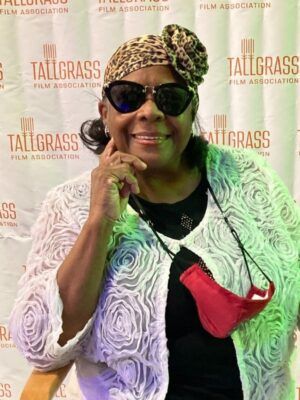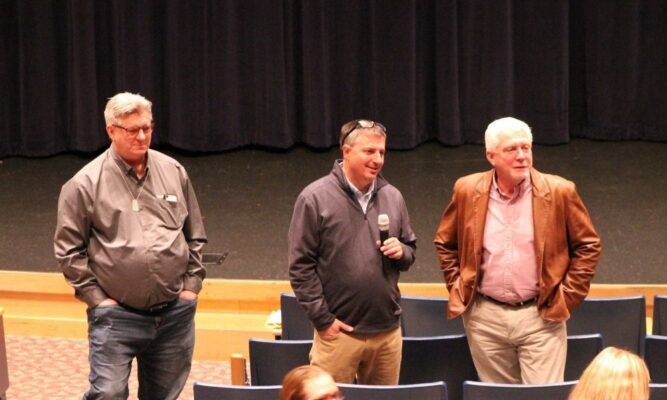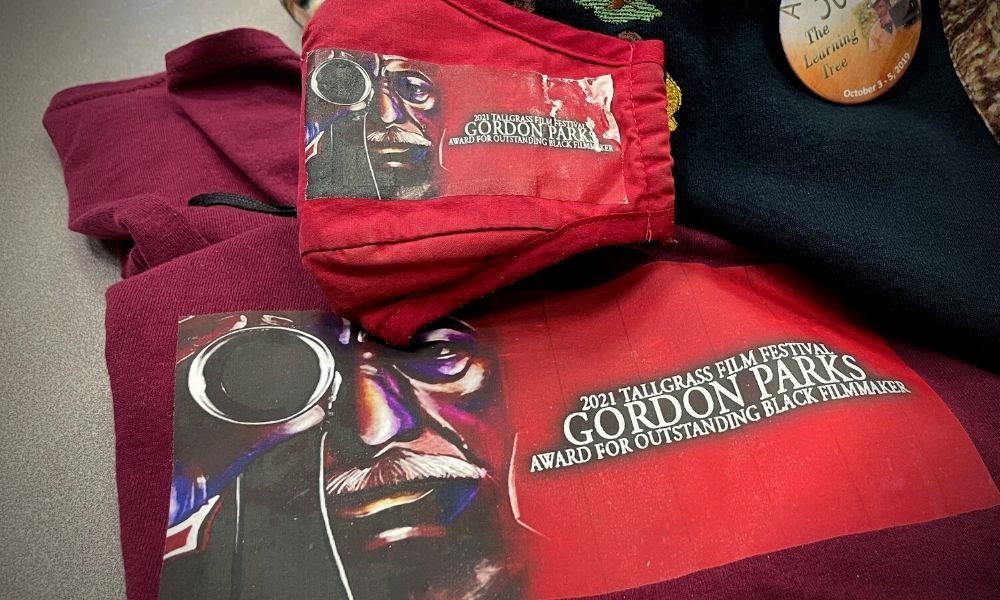Wilma Moore-Black ‘92 said she feels honored to have been part of the newest Tallgrass Film Festival award honoring Gordon Parks.
Moore-Black is the publicist of Gordon’s son, David, who spoke at the ceremony and presented the Gordon Parks Award for Black Excellence in Filmmaking to its recipient.
The festival took place Oct. 20-24 and the 2021 inaugural winner was given to “Finding Sally,” directed by Tamara Dawitt and produced by Isabelle Couture.
David said his dad would be proud and honored to know of this award’s existence. “It is an honor to have a film award as a tribute to the unique and gifted Gordon Parks. Gordon Parks was compelled from the conception of a film idea to its final edit to always give his best. He worked relentlessly and was so dedicated to perfection. One of Gordon’s goals was to produce quality work regardless of the budget. I wish he was alive to judge and present the first Tallgrass Festival Film award to a deserving filmmaker who treasures and respects the art of filmmaking.”
Inspired by Gordon Parks’ legacy

Moore-Black said she has admired Gordon since the time she first saw “The Learning Tree” as a young girl.
“He is so gifted and is valuable and instrumental in being a change agent — more so than he envisioned,” said Moore-Black. “He was gifted in so many ways. Arts, music, film, literature, you name it. He found the camera was a nonviolent weapon to fight racism, bigotry, inequality and discrimination.”
She enjoys giving back to her community and was happy to be a volunteer for the film festival’s organizers, especially because it is related to her work and her passion.
As a volunteer for the award committee, she focused on outreach and helping committee members organize.
“I thought to myself, ‘How great can this inaugural award be? What can I bring to this role as a volunteer?’ So I stepped up, put my big-girl britches on and found the time to give this as much focus as I could,” said Moore-Black.
“I tried to use all my teaching and journalism experience to help this award enhance what Gordon did and who he was. So I met weekly with the marketing team. I’m an ideas person and God gave me the gift of collaboration. I love working with other people to bring on some sort of change.”
Helping others is one of the reasons she chose to serve as publicist for David. Her long-term goal in that role is to help David better tell his own story.
“His dad didn’t want him to live off his legacy but to create his own legacy,” she explained. “I’ve tried to help David find who he is and what difference he can make.”
Faith as the foundation
Moore-Black said much of who she is today came from the influence and guidance of others, but most of all, the strength she has found in her faith — and her mother was a big part of that equation.
“Finding strong Black women as influential people in my life was an important factor in how I was shaped and the woman I strive to be today. I rely heavily each and every day on God’s purpose and strain to hear his voice and guidance.”
Her faith didn’t come until later in life, though. She believes that it’s a choice and everyone’s journey is different. There were many times someone would come into her life and she would face the choice of whether to follow that person or follow God.
I rely heavily each and every day on God’s purpose and strain to hear his voice and guidance.”
Wilma Moore-Black
“It took me a long time. … I ain’t always been this way. My mama said to me, ‘One day, you’ll know for yourself. I pray for you every day. He (God) becomes your mother, your father. … He is the almighty. I may not know how to tell you to make you understand, but one day you’ll know for yourself.’”
That guidance from her mother is what she falls back on in many life situations. And because she wants to share that with others, she searches for ways to give back — and volunteering is one outlet she finds purposeful.
Inspiring others through filmmaking
Volunteering for the film festival was a natural fit for Moore-Black.
“These filmmakers, to me, who have applied for this award, want to show respect and honor to Gordon Parks, the renaissance man. What an amazing power within itself. What a story you have to tell, especially if you are the recipient of this award. But greater than that, what message are you now going to share? What legacy will you create?”
Her experience volunteering for the Tallgrass Film Festival caused Moore-Black to envision the type of film she would dream of making if the opportunity ever presented itself.
Because she has a blended family, she would like to see a film created to help her grandchildren understand God’s love for all people, regardless of culture and skin color.
“I tell my grandbabies, ‘There are all kinds of colors but there is one God. He created you and me, even though we are different colors. God is so great, he can make any color. Just like the alphabet — 26 letters can make millions of words.’
“I tell them, ‘God can do so much with all the colors. We must find what we have in common. God doesn’t care about your color, He just wants to know that you believe and you have faith and you want to live on and on until it’s time for you to go to glory.’”
What message are you now going to share? What legacy will you create?”
Wilma Moore-Black
She said she asked her granddaughter once, “If I cut my finger, what would happen?” Her granddaughter responded, “You’re going to bleed.”
She responded to her granddaughter with, “What color is that? Red.”
Moore-Black said, “We are all made of the same thing. And what does that color symbolize about Jesus? What happened to him on the cross? He bled like we bleed. I want my grandchildren to celebrate diversity and to celebrate who they are and what they can achieve.”

Filmmakers show ‘Once Was Lost’ Father Kapaun documentary at Newman
Award-winning journalist Roy Wenzl and photojournalist Travis Heying paired up to create the newly released documentary “Once Was Lost: The 70-Year Search for Chaplain Emil Kapaun,” which was shown to a live audience in the De Mattias Performance Hall at Newman.

